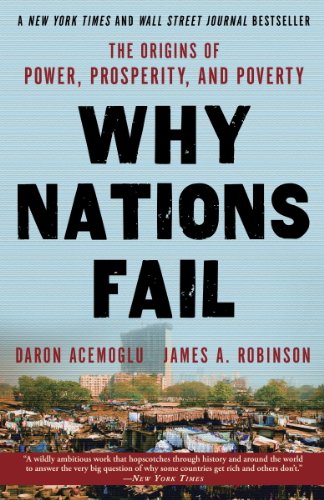Why Nations Fail Audiobook by Daron Acemoglu

text
The scholarly work of Daron Acemoglu as well as James Robinson is already extensively recognized among financial historians, economic experts and also political researchers. Why Nations Fail Audiobook by Daron Acemoglu Download. In Why Countries Fail Acemoglu as well as Robinson look for to share to a much broader audience the outcomes of several years’ path-breaking study on the historic role of establishments– defined as “the rules influencing just how the economic situation works, as well as the motivations that motivate individuals”– and their influence (p. 73). The outcome is a highly legible job of massive geographical and also sequential range that deals with among the most pressing issues of the modern world. With much of its web content including good, antique historic narrative– something I did not quite expect– this book will without doubt interest a broad readership.
The standard situation that the writers look for to make in guide is a basic one, particularly that countries with extractive political and also economic establishments are most likely to be inadequate, whereas those with inclusive establishments are most likely to be abundant. Politics is extremely important: the presence of centralised and also pluralistic political institutions is the crucial to the sustained existence of comprehensive economic establishments. While a degree of economic development could be possible under extractive establishments, such growth is not sustainable, as shown by the cases of, for example, the later Roman Empire or the Soviet Union. When a country has started to relocate in the direction of comprehensive establishments a positive responses loophole could aid to keep them in position, but extractive institutions are also sustained by path dependence, with those in power frightened of the “creative damage” produced by modification, generating a vicious cycle. Why Nations Fail Audio Book Free. The disagreement advanced is not, nonetheless, among institutional determinism. Little institutional differences, and also exactly what the authors describe as “institutional drift” in time can engage with “critical junctures” and also historic contingency to produce an adjustment in course. By analysing such institutional advancement in its historic setting, Acemoglu and Robinson suggest that we could much better recognize why some countries are rich as well as others bad, how that pattern might have altered gradually, or even exactly how the problem of international inequality might be attended to in the future.
Striking historic instances are utilized to show the key value of organizations, and also to deny the explanatory power of geography and culture. Both Koreas, joined until the late 1940s, as well as sharing an usual geography and culture, have considering that diverged substantially in institutional and also wealth terms. Unscrupulous Spanish imperialists looking for plunder placed Latin America on a course of extractive and unproductive institutions, while the very same establishments failed to operate in North America, allowing the appearance of freedom as well as organizations extra conducive to development. Instance confirmed? Well, as much as a point. It is absolutely tough to challenge the case that “establishments matter”, as well as the authors themselves have actually played a significant function in showing the significance of colonial establishments, as an example, in shaping the economic advancement of colonized nations, and also in the primacy of political institutions in shaping economic ones. Couple of academic viewers will certainly take issue with the basic message of this important book. What several viewers will be less comfortable with, possibly, is the oversimplification certainly associated with virtually any kind of monocausal explanation, and also the wholesale being rejected of other competing descriptions of historical growth. To be reasonable, the authors in the verdict recognize the limitations of their approach, yet their overstated depiction of the determinism associated with geographical or cultural explanations, for instance, prevents them from acknowledging the refined historical interplay in between geographical variables, culture (nonetheless that may be specified) as well as institutions, whether extractive or inclusive. For instance, the writers’ own account shows that a significant reason why the extractive institutions of the Spanish might not be copied in North America was the very absence of treasures (gold and silver) that could be plundered. Acemoglu and also Robinson have additionally in the past been criticised for “compressing” background, as well as their concept raises major concerns regarding just what time periods matter in institutional terms. The extractive Mayan Empire, for example, remained to create wealth over greater than six centuries.